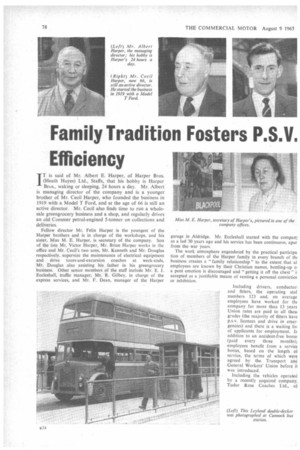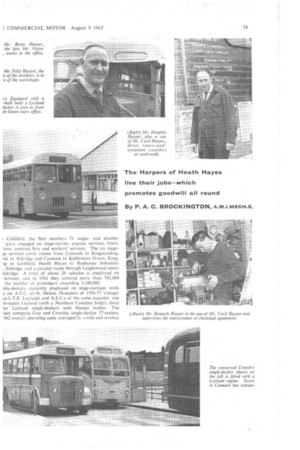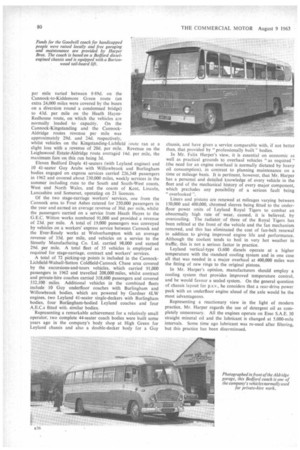Family Tradition Fosters P.S.V.
Page 80

Page 81

Page 82

If you've noticed an error in this article please click here to report it so we can fix it.
Efficiency
The Harpers of Heath Hayes live their jobs—which promotes goodwill all round By P. A. C. BROCKINGTON, A.M.I.MECH.E. IT is said of Mr. Albert E. Harper, of Harper Bros. (Heath Hayes) Ltd., Staffs, that his hobby is Harper Bros., waking or sleeping, 24 hours a day. Mr. Albert is managing director of the company and is a younger brother of Mr. Cecil Harper, who founded the business in 19.19 with a Model T Ford, and at the age of 66 is still an active director. Mr. Cecil also finds time to run a wholesale greengrocery business and a shop, and regularly drives an old Commer petrol-engined 5-tonner on collections and deliveries.
Fellow director Mr. Felix Harper is the youngest of the Harper brothers and is in charge of the workshops, and his sister, Miss M. E. Harper, is secretary of the company. Son of the late Mr. Victor Harper, Mr. Brian Harper works in the office and Mr. Cecil's two sons, Mr. Kenneth and Mr. Douglas respectively, supervize the maintenance of electrical equipment and drive tours-and-excursion coaches at week-ends, Mr. Douglas also assisting his father in his greengrocery business. Other senior members of the staff include Mr. E. J. Eccleshall, traffic manager; Mr. R. Gilbey, in charge of the express services, and Mr. F. Dean, manager of the Harper garage in Aldridge. Mr. Eccleshall started with the compan; as a lad 30 years ago and his service has been continuous, apar from the war years.
The work atmosphere engendered by the practical participa tion of members of the Harper family in every branch of thi business creates a "family relationship" to the extent that al employees are known by their Christian names, bottling-up o a pent emotion is discouraged and "getting it off the chest" accepted as a justifiable means of venting a personal convictior or inhibition.
Including drivers, conductor and fitters, the operating staf numbers 123 and, on average employees have worked for thc company for more than 13 years Union rates are paid to all thesc grades (the majority of fitters haw p.s.v. licences and drive in emer gencies) and there is a waiting list of applicants for employment. Ir addition to an accident-free bonu! (paid every three months), employees benefit from a servict bonus, based on the length ol service, the terms of which were agreed by the Transport and General Workers' Union before ii was introduced.
Including the vehicles operated by a recently acquired company, Tudor Rose Coaches Ltd., ol Coldfield, the fleet numbers 71 singleand double
• p.s.v. engaged on stage-carrier, express services, tours, ions, contract hire and workers' services. The six stagege services cover routes from Cannock to Kingstanding, >ck to Aldridge and Cannock to Kiddemore Green. Kingig to Lichfield. Heath Hayes to Redhouse Industrial , Aldridge. and a circular route through Leighswood estate Odridge. A total of about 20 vehicles is employed on services, and in 1962 they covered more than 702,000 the number of passengers exceeding 3,180,000.
tble-deckers currently employed on stage-carriage work e six A.E.C. ex-St. Helens 56-seaters of 1956-57 vintage; ex-L.T.E. Leylands and A.E.C.s of the same capacity: one 'A-seater Leyland (with a Northern Counties body); three ter Leyland single-deckers with Harper bodies. The Icier comprise Guy and Crossley single-decker 37-seaters. 962 overall operating costs averaged 2s. a mile and revenue
per mile varied between 8-89d. on the Cannock-to-Kiddemore Green route (an extra 24,000 miles were covered by the buses on a diversion round a condemned bridge) to 43d. per mile on the Heath HayesRedhouse route, on which the vehicles are normally loaded to capacity. On the Cannock-Kingstanding and the CannockAldridge routes revenue per mile was approximately 29d. and 24d. respectively, whilst vehicles on the Kingstanding-Lichficld route ran at a slight loss with a revenue of 20d. per mile. Revenue on the Leighswood Estate-Aldridge route averaged I4d. per mile, the maximum fare on this run being 3d.
Eleven Bedford Duple 41-seaters (with Leyland engines) and 10 41-seater Guy Arabs with Willowbrook and Burlingham bodies engaged on express services carried 226,348 passengers in 1962 and covered about 230,000 miles, weekly services in the summer including runs to the South and South-West coasts, West and North Wales, and the coasts of Kent, Lincoln, Lancashire and Somerset, operating on 21 licences.
Of the two stage-carriage workers' services, one from the Cannock area to Four Ashes catered for 250,000 passengers in the year and earned an average revenue of 30d. per mile, whilst the passengers carried on a service from Heath Hayes to the G.E.C. Witton works numbered 91,000 and provided a revenue of 23d. per mile. A total of 19,000 passengers was conveyed by vehicles on a workers' express service between Cannock and the Ever-Ready works at Wolverhampton with an average revenue of 35d. per mile, and vehicles on a service to the Streetly Manufacturing Co. Ltd. carried 98,000 and earned 29d. per mile. A total fleet of 35 vehicles is employed as required for stage-carriage, contract and workers' services.
A total of 72 picking-up points is included in the CannockLichfield-Walsall-Sutton Coldfield-Cannock Chase area covered by the excursions-and-tours vehicles, which carried 91,000 passengers in 1962 and travelled 208,000 miles, whilst contract and private-hire coaches carried 318,600 passengers and covered 332,100 miles. Additional vehicles in the combined fleets include 10 Guy underfloor coaches with Burlingham and Willowbrook bodies, which are powered by Gardner 6LW engines, two Leyland 41-seater single-deckers with Burlingham bodies, four Burlingham-bodied Leyland coaches and four A.E.C.s fitted with similar bodies.
Representing a remarkable achievement for a relatively small operator, two complete 44-seater coach bodies were built some years ago in the company's body shop at High Green for Leyland chassis and also a double-decker body for a Guy chassis, and have given a service comparable with, if not better than, that provided by "professionally built" bodies.
In Mr. Felix Harper's view, it is essential on economic as well as practical grounds to overhaul vehicles "as required" (the need for an engine overhaul is normally dictated by heavy oil consumption), in contrast to planning maintenance on a time or mileage basis. It is pertinent, however, that Mr. Harper has a personal and detailed knowledge of every vehicle in the fleet and of the mechanical history of every major component, which precludes any possibility of a serious fault being "overlooked ".
Liners and pistons are renewed at mileages varying between 150,000 and 400.000, chromed sleeves being fitted to the underfloor power units of Leyland Royal Tigers to combat an abnormally high rate of wear, caused, it is believed, by overcooling. The radiator of three of the Royal Tigers has been refitted at the front of the vehicle and the fan mechanism removed, and this has eliminated the cost of fan-belt renewal in addition to giving improved engine life and performance. Although the coolant tends to boil in very hot weather in traffic. this is not a serious factor in practice.
Leyland vertical-type 0.600 diesels operate at a higher temperature with the standard cooling system and in one case all that was needed in a major overhaul at 400,000 miles was the fitting of new rings to the original pistons.
In Mr. Harper's opinion, manufacturers should employ a cooling system that provides improved temperature control, and he would favour a sealed system. On the general question of chassis layout for p.s.v., he considers that a rear-drive power pack with an underfloor engine ahead of the axle would be the most advantageous.
Representing a reactionary view in the light of modern practice, Mr. Harper regards the use of detergent oil as completely unnecessary. All the engines operate on Esso S.A.E. 30 straight mineral oil and the lubricant is changed at 5,000-mile intervals. Some time ago lubricant was re-used after filtering, but this practice has been discontinued.
































































































































